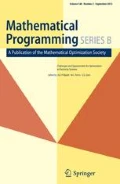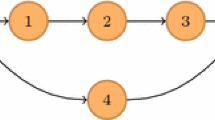Abstract
New observations are made about two lower bound schemes for single-machine min-sum scheduling problems. We find that the strongest bound of those provided by transportation problem relaxations can be computed by solving a linear program. We show the equivalence of this strongest bound and the bound provided by the LP relaxation of the time-indexed integer programming formulation. These observations lead to a new lower bound scheme that yields fast approximation of the time-indexed bound. Several techniques are developed to facilitate the effective use of the new lower bound in branch-and-bound. Numerical experiments are conducted on 375 benchmark problems of the total weighted tardiness problem from OR-Library. Results obtained with our new method are spectacular; we are able to solve all 125 open problems to optimality.
Similar content being viewed by others
References
Abdul-Razaq T.S., Potts C.N., van Wassenhove L.N. (1990) A survey of algorithms for the single machine total weighted tardiness scheduling problem. Discrete Appl. Math. 26, 235–253
van den Akker J.M., van Hoesel C.P.M., Savelsbergh M.W.P. (1999) A polyhedral approach to single-machine scheduling problems. Math. Program. 85, 541–572
van den Akker J.M., Hurkens C.A.J., Savelsbergh M.W.P. (2000) Time-indexed formulations for machine scheduling problems: Column generation. INFORMS J. Comput. 12(2): 111–124
Applegate D., Cook W. (1991) A computational study of the job-shop scheduling problem. ORSA J. Comput. 3, 149–156
Avella P., Boccia M., D’Auria B. (2005) Near-optimal solutions of large-scale single-machine scheduling problems. INFORMS J. Comput. 17(2): 183–191
Balas E. (1969) Machine sequencing via disjunctive graphs: an implicit enumeration algorithm. Oper. Res. 17, 941–957
Balas E. (1979) Disjunctive programming. Ann. Discrete Math. 5, 3–51
Bigras L., Gamache M., Savard G. (2005) Time-indexed formulations and the total weighted tardiness problem. G-2005-30, Les Cahiers du GERAD
Bülbül, K., Kaminsky, P., Yano, C. (2005) Preemption in single machine earliness/tardiness scheduling. J. Sched. Forthcoming
Chekuri C., Motwani R., Natarajan B., Stein C. (2001) Approximation techniques for average completion time scheduling. SIAM J. Comput. 31, 146–166
Congram R.K., Potts C.N., van de Velde S.L. (2002) An iterated dynasearch algorithm for the single-machine total weighted tardiness scheduling problem. INFORMS J. Comput. 13(1): 52–67
Dyer M.E., Wolsey L.A. (1990) Formulating the single machine sequencing problem with release dates as a mixed integer program. Discrete Appl. Math. 26, 255–270
Gelders L., Kleindorfer P.R. (1974) Coordinnating aggregate and detailed scheduling in the one-machine job shop: Part I. Theory. Oper. Res. 22, 46–60
Lawler E.L. (1964) On scheduling problems with deferral costs. Management Sci. 11(2): 280–288
Nemhauser G.L., Wolsey L.A. (1988) Integer and Combinatorial Optimization. John Wiley, NY
Pan Y. (2003) An improved branch and bound algorithm for single machine scheduling with deadlines to minimize total weighted completion time. Oper. Res. Lett. 31(6): 492–496
Potts C.N., van Wassenhove L.N. (1985) A branch and bound algorithm for the total weighted tardiness problem. Oper. Res. 33(2): 363–377
Queyranne, M., Schulz, A.S. (1985) Polyhedral approaches to machine scheduling. Preprint 408/1994, Math. Dept., Tech. Univ. Berlin. Revised June 1997
Sourd F., Kedad-Sidhoum S. (2003) The one-machine problem with earliness and tardiness penalties. J. Sched. 6, 533–549
Sousa J.P. (1989) Time indexed formulations of non-preemptive single-machine scheduling problems. Ph.D. thesis, Faculté des Sciences Appliquées, Université Catholique de Louvain, Louvain-la-Neuve, Belgium
Sousa J.P., Wolsey L.A. (1992) A time indexed formulation of non-preemptive single machine scheduling problems. Math. Program. 54, 353–367
Author information
Authors and Affiliations
Corresponding author
Rights and permissions
About this article
Cite this article
Pan, Y., Shi, L. On the equivalence of the max-min transportation lower bound and the time-indexed lower bound for single-machine scheduling problems. Math. Program. 110, 543–559 (2007). https://doi.org/10.1007/s10107-006-0013-4
Received:
Accepted:
Published:
Issue Date:
DOI: https://doi.org/10.1007/s10107-006-0013-4




